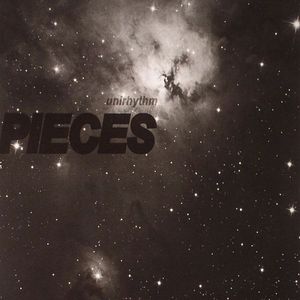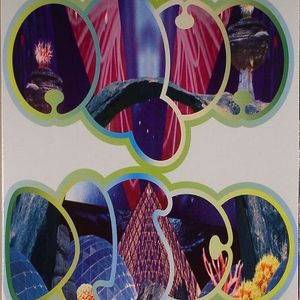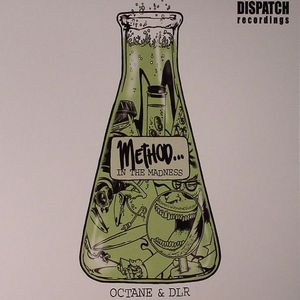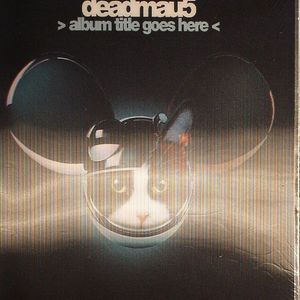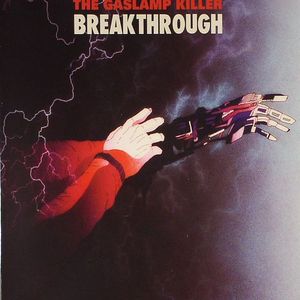
Juno Recommends CD Albums
CD Album Recommendations October 2012
28 Sep 2012
Read more...
1
Review: By his legendary standards of messiness, Ricardo Villalobos seems to have calmed down a bit of late. Perhaps it's related to spending more time in the studio, because Dependent & Happy is his first solo full-length for four years. It's a pretty good set, all told, delivering warmer, groovier minimal tracks than we've come to expect from the skeletal, perma sweating Chilean. Notably, there are more melodies, looser drums - some of which have a smooth swing that suggests he's rediscovering his Mojo - and even the odd track featuring rolling electric pianos and a fuller sound (see the devilishly funky "Samma" and Clavinet-boasting "Tu Actilud").
...Read more
in stock $21.84
2
Review: Mala's album project comes to light with a healthy amount of expectation. The DMZ / Deep Medi Musik main man has always carried a reverence amongst the dubstep scene for his unfussy approach, staying true to the sound he helped forge in the nascent days of the genre while avoiding over-exposure or buckling to hype and trend where so many of his peers succumbed to change. As such this project sees the man well outside of his comfort zone as he tackles a specific album project whilst sticking his head more clearly overground to work with Gilles Peterson on an adventure in Cuba working with local musicians. This is most definitely Mala's music, and the spiritual, tribal nature of his productions to date only gets enhanced by the influx of Cuban folk sounds. This is no simple case of ripping samples and dropping them for token effect though; the percussive patterns and licks of piano, guitar, horns and voice are completely interwoven into the South London pressure as if they were always meant to be. It's testament to the pure approach Mala takes in the studio that he manages to balance these unlikely bedfellows to such fluid effect. Undoubtedly there will be naysayers who will argue that in doing an album of this nature Mala is diluting his purist vision for dubstep, but in truth the approach and end results he has managed to conjure up bring a revitalising, fresh angle to the genre, which is what it needs in abundance. There's maybe a lack of the "shock of the new" factor as Cubano music is not exactly a stranger to UK dance music forms, and Mala isn't exactly switching his own stance too drastically, but ultimately that doesn't matter. The whole album is direct and immensely satisfying to listen to, capturing the alluring spirit of South American folk tradition and empowering it with the transcendental nature of dubstep in its finest form
...Read more
out of stock $9.39
3
Review: Although he's been an integral part of the Detroit deep house scene for nearly two decades, and commands the respect of his contemporaries, Marcellus Pittman has never really enjoyed the same level of acclaim as many of them. His long overdue first full-length Pieces may alter the perceptions of them that don't know. Formidably underground in its no-nonsense approach, it mixes raw, analogue house jams with the sort of spacey deepness most often associated with Motor City acts. In the latter category, the fluid "If The Earth Could Talk" and springy "Loneliness Leave Me Alone" stand out, while the "anything goes" synth jam "Random Acts of Insanity" shows his rarely seen playful side.
...Read more
out of stock $12.71
4
Review: If you're reading this, you're probably aware of the hype surrounding Crosstown Rebels' latest stars-in-the making, Venezuelan production partnership Fur Coat. With a sound that ticks all the right Crosstown Rebels/Visionquest boxes - shuffling, vaguely atmospheric grooves, fluid basslines and moody, occasionally quietly soulful vocals - there's little doubt that they're destined for the top. Their position as stars is secured by the presence of previous single "You & I", a celebration of party powders that has become something of an anthem.
out of stock $13.25
5
Review: Scott Monteith is something of an electronic veteran, having plied his trade with the likes of Scape and Wagon Repair since the turn of the 2000s. Over the years, he'd steadfastly refused to stick to one style, flitting between dub techno, glitchy minimalism, jaunty electronica and paranoid ambience. Throughout, his releases have retained a heightened sense of atmosphere. Here, he delves into his varied box of tricks for eighth solo full-length. Those familiar with his style will feet right at home, as Monteith contrasts the organic-electronic fusion of "Alamut" and deep dubstep-pop of "Lazy Jane", with the ricocheting minimalism of "Punta Des Chorros" and dense dub techno of "Yard".
...Read more
out of stock $13.25
6
Review: Making their intentions clear from the offset, Seahawks are proudly representing all things water-based once again on their sixth album. It's impressive that they've managed to notch up so much material considering they only started releasing in 2010, but they've obviously struck upon a sound that fits them and are mining it for all its worth. It's a dreamy kind of downtempo that has whispers of disco and funk, all carefully guided through heavy processing that emphasises the tidal swell of their elemental muse. It's a decidedly chilled-out affair that favours strung out jams to focused composition, coming on just a little prog but sounding no weaker for it.
...Read more
out of stock $14.37
7
Review: The EP prior to Peter Van Hoesen's Perceiver was called Transitional State, and the title sums up the approach on this album and the general direction that he has been heading in for the past few years. Listen to even his recent dance floor-based releases on Komisch, Ostgut and Time To Express and you'll hear glitchy slivers of percussion amid the punishing, merciless basslines. Van Hoesen has emphasised this abstract side to his sound on Perceiver. "Objects from the Past" and "To Alter A Vector" unfold in slow motion, with textured sounds floating over lurching rhythms, breaking occasionally to allow the dubby beats come to the fore. In between balancing the functional and the abstract, the album also presents a third way, and it results in the most impressive track on the album; "Nefertiti Always Beyond" boasts nickel-plated drums and Peter's trademark sub-bass, but there is something looser about the arrangement. What it may lack in precision it compensates with a sense of punky energy, its rhythm spasming like a Magazine song trapped in the body of a relentless techno arrangement. It's the centre piece in a perception altering album.
...Read more
out of stock $15.47
8
Review: Having previously made a splash with their "Candyflip" and "A Murder of Crows" singles, vest-wearing techno separatists Sam Barker and Andy Baumecker step forth with their debut full-length. It's a typically Teutonic kind of set, mixing crackly moments of murky dancefloor techno ("Silo", "Buttcracker") with downbeat electronica ("Tranq"), garage-techno fusion (see the excellent "No Body"), dub techno ("Databass 133 1/3") and occasional forays into subdued but anthemic upbeat territory. It's these that really hit the spot, with the Detroitian hypnotism of "Trans It" and breathlessly beautiful "Spur" standing out.
...Read more
out of stock $14.37
9
out of stock $13.25
10
out of stock $16.57
11
Cat: DISODLP 001. Rel: 10 Sep 12
Drum & Bass / Jungle
Review: Production duo Octane and DLR have been operating around the fringes of the D&B scene for some time, without really leaving a lasting impression. This debut album - a mixture of their productions, plus a smattering of tunes from side project Cymatic - may change that. Something akin to listening to late night pirate radio sometime in the early 2000s, it gleefully flits between smoky rollers, atmospheric post-dubstep jams and the sort of murky, leftfield bass-tronica that was once the sole preserve of dBridge. There are some great moments, not least the sparkling jazz-stepper "Let Me Go" and the fearlessly glitchy "Cometh The Horde".
...Read more
out of stock $9.94
12
Cat: PERMVAC 096-2. Rel: 24 Sep 12
Disco/Nu-Disco
Review: Cosmic explorers Simon "Woolfy" James and Dan Hastie have now been effortlessly blending leftfield rock, dub disco, Balearica and spacious electronica for well over a decade. Despite this history, they're probably best known for 2008's superb The Astral Projections of Love (their second full length), an album that twinkled with intergalactic atmospherics and psychedelic intent. The Return of Love, their long-planned follow-up, is a noticeably softer set, adding folksy acoustic diversions (see "Electric Storms" and "Cherry Blossoms") and blissful MDMA pop (check "Set Me Loose" and "In Your Own Worlds") to their tried-and-tested star-gazing formula.
...Read more
out of stock $9.94
13
Review: Everyone knows "Carino", Mike Pickering and company's 1987 Latino-house cut that is regularly cited as the first "proper" British house record. Few, though, know the various follow-ups that the Manchester-based trio put out on DeConstruction over the following year. In some ways, it's a pity; while "Carino" remains their strongest moment, they produced some other very strong material that somehow falls through the cracks. This compilation from reissue specialists LTM tells the whole story for the first time, offering up a string of lesser-known gems such as the cowbell-driven "De Na Mas", darker "Keep On Drivin" and touchy-feely "I Aint Nightclubbin". Interestingly, there's also a new, deliciously E'd-up Motor City Drum Ensemble mix of "Carino".
...Read more
out of stock $12.15
14
Review: For a man with so many Djing (or play button pressing) commitments, Joel Zimmerman is surprisingly productive. Album Title Goes Here (the wag, etc) is his 10th album in six years - a record that will keep the mouse head wearing Canadian in luxury cheese for years to come. As a set, Album Title Goes Here is pretty much what you'd expect, delivering various takes on house that are deeply rooted in his pumping, main room style. There are darker, tech-tinged moments ("Take Care of the Proper Paperwork"), shimmering faux ambient cuts ("Closer"), noisy electro-house rinse-outs ("Professional Griefers") and a well-executed tribute to fellow mask-wearers Daft Punk ("Maths"). Fans will love it.
...Read more
out of stock $8.01
16
out of stock $11.61
17
out of stock $15.47
18
out of stock $13.25

 USD
USD






